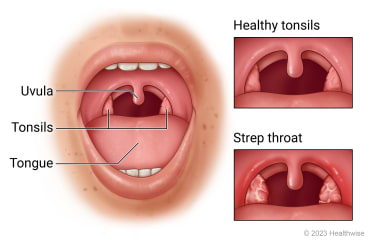
Overview
Strep throat is a bacterial infection that causes sudden, severe sore throat and fever. Symptoms may include red, swollen tonsils that may have white or yellow patches. A strep test may be needed to tell if the sore throat is caused by strep bacteria. Treatment can help ease symptoms and may prevent future problems.
Follow-up care is a key part of your treatment and safety. Be sure to make and go to all appointments, and call your doctor if you are having problems. It's also a good idea to know your test results and keep a list of the medicines you take.
How can you care for yourself at home?
- Take your antibiotics as directed. Do not stop taking them just because you feel better. You need to take the full course of antibiotics.
- Strep throat can spread to others until 24 hours after you begin taking antibiotics. During this time, avoid contact with other people at work, school, or home, especially infants and children. Do not sneeze or cough on others, and wash your hands often. Keep your drinking glass and eating utensils separate from those of others. Wash these items well in hot, soapy water.
- Gargle with warm salt water several times a day to help reduce swelling and relieve pain. Mix 1/2 teaspoon of salt in 1 cup of warm water.
- Take an over-the-counter pain medication, such as acetaminophen (Tylenol), ibuprofen (Advil, Motrin), or naproxen (Aleve). Read and follow all instructions on the label.
- Try an over-the-counter anesthetic throat spray or throat lozenges, which may help relieve throat pain.
- Drink plenty of fluids. Fluids may help soothe an irritated throat. Hot fluids, such as tea or soup, may help your throat feel better.
- Eat soft solids and drink plenty of liquids. Flavored ice pops, ice cream, scrambled eggs, sherbet, and gelatin dessert (such as Jell-O) may also soothe the throat.
- Get lots of rest.
- If you smoke, try to quit. If you can't quit, cut back as much as you can. Smoking can interfere with healing. If you need help quitting, talk to your doctor about stop-smoking programs and medicines. These can increase your chances of quitting for good.
- Use a vaporizer or humidifier to add moisture to the air where you sleep. Follow the directions for cleaning the machine.
When should you call for help?
Call your doctor now or seek immediate medical care if:
- You have new or worse symptoms of infection, such as:
- A new or higher fever.
- A fever with a stiff neck or severe headache.
- New or worse trouble swallowing.
- Pain that becomes much worse on one side of your throat.
Watch closely for changes in your health, and be sure to contact your doctor if:
- You are not getting better after 2 days (48 hours) after taking an antibiotic.
Where can you learn more?
Go to http://www.healthwise.net/patientEd
Enter B914 in the search box to learn more about "Strep Throat in Teens: Care Instructions".
Current as of: October 27, 2024
Author: Ignite Healthwise, LLC Staff
Clinical Review Board
All Ignite Healthwise, LLC education is reviewed by a team that includes physicians, nurses, advanced practitioners, registered dieticians, and other healthcare professionals.

